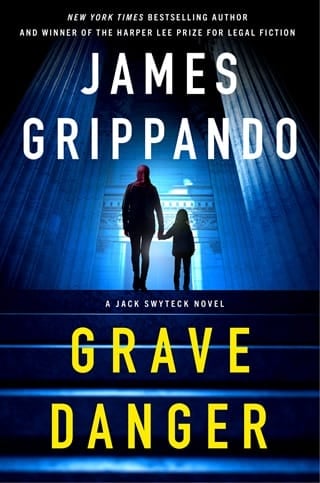Chapter 27
Jack hated Monday morning surprises. He was on his way to the criminal courthouse for the arraignment of a new client when
Judge Carlton’s assistant reached him on his cell phone. As Jack’s abuela might have said, it was one heck of a chiste mal de lunes , a bad Monday joke.
“Judge Carlton has just issued a digital order directing both parties and their counsel to appear in his chambers at noon
today,” she said.
It didn’t sound optional. “My client and I will be there.”
“The attendance of Yasmin Bazzi is also required.”
As of Friday, the judge’s order on a forensic psychiatric evaluation had extended only to Zahra. “Can I ask why Yasmin has
to be there?”
“That’s all the information I have, Mr. Swyteck.”
Jack thanked her, and the call ended.
At noon, as ordered, Jack, Zahra, and Yasmin appeared outside the electronically secured door to Judge Carlton’s chambers.
Jack had gone to Zahra’s town house first, and they’d kept the conversation light since picking up Yasmin from school. He’d
explained what a courtroom is, what judges do, and why they wear black robes. The “field trip” continued all the way to Judge
Carlton’s chambers.
“Yasmin, this is where the very nice judge and his helpers do their work when they’re not in the courtroom.”
“What if he’s not nice?” asked Yasmin.
“Oh, he’ll be very nice to you, Yasmin.” Jack couldn’t say the same for the lawyers.
The door opened, and the three of them entered the reception area. A young woman introduced herself as Judge Carlton’s law clerk and took Zahra and Yasmin to the conference room. The judge’s assistant escorted Jack down the hall to the judge’s private chambers. Farid’s lawyer was waiting in one of the wing chairs. Jack sat in the open chair. Judge Carlton entered from the robing room and took a seat behind his desk, facing the lawyers. He greeted them and then delivered the news.
“Counsel, I’ve summoned you here because I have changed my mind about moving forward with a forensic psychiatric examination
of Zahra Bazzi.”
Jack thought his opposing counsel might jump up and dance a jig. He saw little chance of winning the case without an independent
expert’s opinion that Zahra’s inability to testify about Farid’s abuse was due to PTSD.
“Bottom line is that the process takes too long,” the judge continued. “We could be looking at weeks, not days.”
“Judge, in the scheme of things, a few weeks is not an unreasonable delay,” said Jack.
“My client has been separated from his daughter for over a year,” said Beech. “A few weeks is an eternity.”
“There’s a better solution,” the judge said. “But it will require the cooperation of both parties.”
The lawyers listened as the judge described a technique used to great effect by the Honorable Denny Chin, a highly respected
federal district judge in New York who had since taken senior status on the court of appeals.
“Judge Chin was a pioneer and an innovator in abduction cases under the Hague Convention,” the judge said. “He also graduated
magna cum laude with a BA in psychology from Princeton University, so it’s fair to say he knew his way around the block.”
Jack had read about Chin in preparing for Zahra’s case, which gave him a hint as to where Judge Carlton was heading.
“Judge Chin recognized that the rules in a Hague proceeding are relaxed for good reason—namely, the child’s well-being. He
understood long ago that sometimes the best interest of the child calls for an unconventional approach.
“So, with a tip of the hat to Judge Chin, here’s what I propose. I want to sit down with Yasmin here in my chambers. Just the two of us, one on one. No lawyers, no parents. A court-appointed forensic psychiatrist will be in the room with us, but only to observe. I will not be wearing my scary black robe. It’ll be more like a visit with my grandchildren. We’ll watch the Disney channel, color, play cards—whatever it takes for her to feel comfortable. I want to talk to her. I want to observe her.”
“Will there be a court reporter, or is this off the record?” asked Jack.
“No court reporter.”
“What about the lawyers?” asked Beech. “Can we observe and listen too?”
The judge considered it. “I don’t want you in the room with me, but I think I can make it work.”
“How?” asked Jack.
“For better or worse, after the attack on the Capitol on January the sixth, I had security cameras installed. Technically,
they’re only for an emergency—in case some lunatic wearing buffalo horns on his head comes charging in here to kidnap me and
my law clerks at spearpoint. But I could have the marshals activate the cameras.”
“What about audio?” asked Jack.
“I have a mic I use for judicial conferences. We can put it right there on the coffee table.”
“I like the approach,” said Jack. “But I’ll have to confirm with my client.”
“Of course,” the judge said. “Ms. Beech? Thoughts?”
“What if my client chooses not to consent?” she asked.
The judge leaned forward in his chair, resting his forearms atop the desk. “Well, Ms. Beech, that would be very disappointing.”
It wasn’t technically coercion, but even a rookie lawyer with the most basic ability to read judicial tea leaves would have
gotten the message.
“I anticipate no objection,” said Beech.
“Good,” said the judge. “We’ll begin at one o’clock, barring the unexpected.”
The lawyers were dismissed.
Jack rose and started toward the door, well aware that, in this case, “unexpected” had a meaning all its own.
Andie stared at her computer screen, confused.
She couldn’t count the number of times, over the span of her career, that she’d accessed the FBI’s Integrated Automated Fingerprint Identification System (IAFIS), Interstate Identification Index, and other data systems administered by the FBI’s Criminal Justice Information Services Division. The system was designed to provide a binary response: “No record found,” or a “hit.” Her search for the name Brian Guthrie had produced a response she’d never seen before.
“What the hell?” she asked, though no one was there to hear.
She retyped Guthrie’s name and was about to run it through the database a second time—but something made her pause. Technically,
an FBI agent’s use of the system was limited to “official business.” She was not one to break rules, at least not without
good reason. Curiosity was not a good enough reason, but her need to know was way beyond mere curiosity. If someone wanted
to make the case that Guthrie was not her “official business,” so be it.
She hit enter . In seconds, the same message reappeared on her screen.
locked.
Andie considered the range of possibilities. It didn’t necessarily mean that Brian Guthrie had a criminal record. His fingerprints
could have been collected for noncriminal reasons, like a background check for employment. The only thing for certain was
that he was in “the system,” and anyone in the system stayed there at least until age ninety-nine if there was a criminal
record, age seventy-five if there was none. Yet Guthrie was “locked.” Andie supposed it could have had something to do with
negotiations for his release from an Iranian prison, but she wanted to know for certain. She could think of only one person
to call. She dialed his cell, and he picked up. He sounded happy to hear from her—until she mentioned Guthrie, her search
of the FBI database, and the confusing result. He stopped her in mid-sentence.
“Andie, what the heck were you thinking when you made this call?”
“I’m just asking you a generic question about the system.”
“You’re asking me about Brian Guthrie.”
“I’m asking about information in the database, which is not classified.”
“It is if it’s locked ,” he said, his voice rising.
It wasn’t the harshest tone Isaac had ever used with her, but it was up there with the time she’d rushed in to make an arrest without waiting for backup from the rest of the Seattle bank robbery squad.
“I’m not trying to put you in an awkward position,” said Andie.
“You never should have run Guthrie’s name through the system. Just because a hundred thousand searches a day go through the
system doesn’t mean no one is watching.”
“Watching? Are you saying I’m being watched ?”
A tense silence followed, and then, finally, he answered.
“Andie, what was the last thing I told you when we talked at the airport?”
She wasn’t sure what he meant by “the last thing,” but she remembered the most important: “You said Guthrie was arrested the
day after the Iranian government claims Ava Bazzi escaped from prison.”
“No, the last thing. What did I say right after that?”
His last words didn’t come to mind. Isaac filled in the blank.
“I told you that you’re on your own from here on out,” said Isaac. “Remember?”
“Understood. I won’t call you again.”
“I didn’t say don’t call me.”
“You said I’m on my own.”
“Which means that—”
“Which means that if there’s any fallout from this, it’s on me, not you.”
“Shit, Andie. Makes me feel pretty small to hear a friend say it out loud, but I’m afraid that’s the way it is.”
“I understand. You’re doing the best you can.”
“Thank you.”
“But I’ll give you another chance to do better.”
It was a light ending, but she hoped he knew she was serious.
“I know you will,” said Isaac, and the call ended without another word.
 Fullepub
Fullepub 



